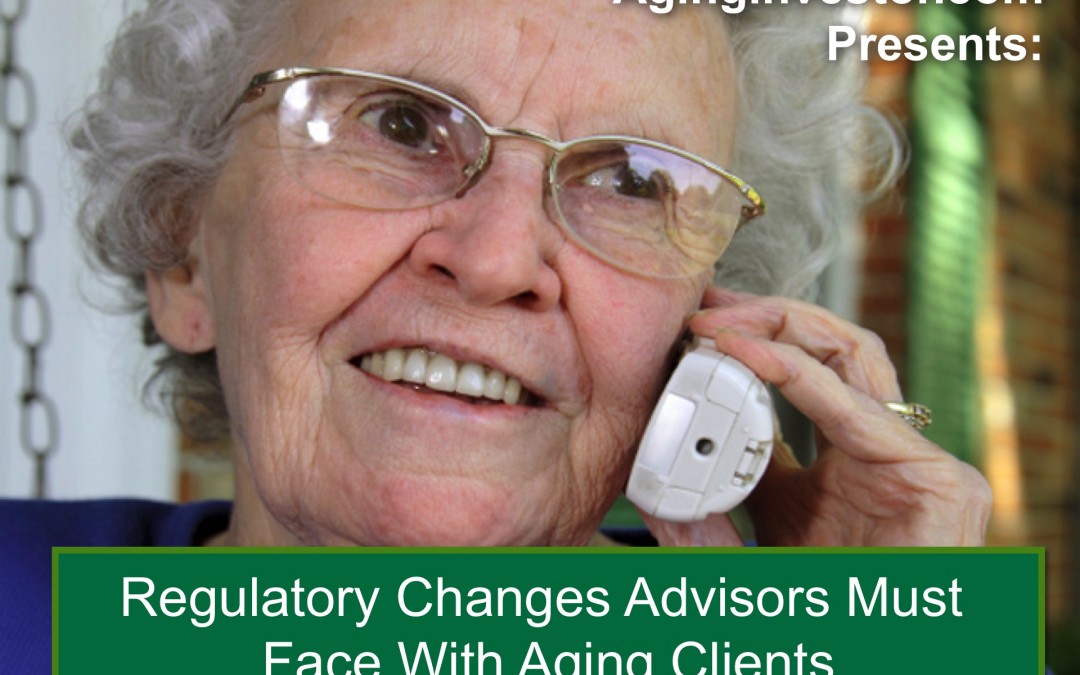



Are Your Own Clients Being Ripped Off?
Is financial abuse happening to YOUR clients right now? Of course it is. There is no escaping it. A recent study puts the amount stolen from elders every year in our country at over $36B. With a problem as big as this, no group of elders is immune.. If you took a survey of your existing clients all age 65 or older, and asked them how many have ever been taken advantage of financially, you would be sure to get some clients who would admit to this. If you look at your own experience and count up any instance you know of, whether it is in your family, your neighborhood or your book of business, you will likely find some financial abuse as well.
Why Is This Important for You?
The amounts stolen, fraudulently taken or just snatched from the unwary, are shocking. Remember that when your client loses assets, you lose fees. That is the most basic reason this should be important to you as a financial professional. Doing the right thing to keep your clients safe is certainly a motivator as well. It shows that you do care about them. And beyond that, the regulators are increasingly aware that financial professionals are in a position to take action and, sometimes, to stop and prevent financial abuse. They will soon get past merely urging you to take action and to report abuse. They will ultimately make it mandatory.
And we think you can do more proactively than merely to understand how to report abuse after the fact. It would be great to catch more criminals but that is extremely difficult in many cases because they are very clever at evading law enforcement. And since family members are the most frequent abusers, we have an added problem in that many elders are reluctant to report abuse by their own to law enforcement. Mom just won’t call Adult Protective Services on her son, even when she knows he has stolen from her. We have seen this with our own eyes There are many instances of scammers getting into relationships with aging folks by phone or on the internet. The “friendly” relationships become addictive. These thieves persuade the victim to withdraw funds from their accounts. This is where the advisor comes in. Unusual withdrawals are an important warning sign of elder abuse. And when the advisor notices this in a client’s account there are choices available about stopping abuse. They include contacting a trusted other the elder has identified and warning them of what is happening. There should be more than one trusted person identified for every client. And by all means, contact Adult Protective Services and report it if you suspect fraud.
If you are worried about privacy rules, don’t be. The regulators of your industry want you to report abuse. They want you to make every effort to keep aging clients financially safer. If you are not sure about privacy, we can help you create a special privacy document here at AgingInvestor.com that gives you permission to call that third party. Every advisor with any client over age 65 should have this and understand how to approach a client about signing it. With permission like this, you should never hesitate to tell APS and the trusted other that you are concerned about your client being financially manipulated.
You can get more details about this elder abuse issue and what you can do as an advisor in Succeed With Senior Clients: A Financial Advisor’s Guide to Best Practices. See particularly the chapter “Financial Elder Abuse: How You Can Fight the Crime of the Century“. It’s available right now so click HERE to get your copy today.
by Carolyn Rosenblatt, RN, Elder law attorney, AgingInvestor.com

Do You Understand Whether Your Client Has Financial Decision-Making Capacity? Or Not?
Capacity and competency are terms loosely thrown around these days. How can you tell if your client has financial capacity? This kind of capacity is the most complex and requires intact judgment. You must have a good working knowledge of it or you could come under scrutiny for giving advice or selling products to an individual who is impaired. One thing is certain: you can’t tell if your client has the capacity for making financial decisions just from a quick call or social chat when ominous signs already exist suggesting that some impairment is present.
What do we know about financial capacity? It is defined as “the capacity to manage money and financial assets in ways that meet a person’s needs and which are consistent with his/her values and self-interest.” This seems straightforward, but it is not. Some people develop brain disease as they age, and with dementia, the erosion of mental capacity can take place over years. During the earliest stages of dementia, the brain cells are being damaged by the disease process, but the person has other brain cells “in reserve” and can still function in many areas without impairment. However, research has found that for people who are developing Alzheimer’s disease, financial capacity is already impaired even at the beginning stage.
If you have an elderly client who is still in charge of his finances, not unusual at all in our aging society, be aware that some clues may point to loss of financial judgment. To see those clues, you will need to observe your client over time and document the warning signs of diminishing capacity. Overall diminished capacity often means that a person does not have financial capacity any longer.
Financial capacity is divided into nine distinct areas. All nine must be intact for a person to have adequate judgment to act in his own best interests. One of the most important of the nine is the understanding of investments.
The person with this area intact is able to engage in and actively participate in developing an understanding of any financial investment decision. Knowing the value of a proposed transaction and the attendant risks are part of this area of competency.
If this sounds complicated, it is. You may be wondering if any of your clients are essentially competent in all nine areas. Some are not. Most people, if you wanted to take the time involved to patiently explain things like risk of an investment in simple terms, would get it. But when a client can’t tell the difference between a twenty-dollar bill and a five-dollar bill, that client is not competent financially, even if he can carry on a perfectly normal conversation about his favorite sports team or politics.
One clue to ask your client about is whether she is able to keep track of and pay all her own bills. If family or any other helper are doing this for her there is a reason. That may be that she forgets bills or pays them twice. That is a sign that financial capacity may be eroded. You need to take the next step and look at other areas of financial capacity before your client makes any further financial decisions.
If you aren’t sure what the nine areas of financial capacity are and you want to find out about this, you can do that fast in a chapter of our book, Succeed With Senior Clients: A Financial Advisor’s Guide to Best Practices. The chapter that will quickly give you the answers you need is “Nuts and Bolts: What Are the Components of Financial Capacity?” Get your copy today by clicking HERE.
By Carolyn Rosenblatt, RN, Elder law attorney, AgingInvestor.com

How Can You Tell If Your Client Has Cognitive Impairment?
Many older people have a bit of difficulty remembering. We often dismiss this when we see it in a client, thinking it’s “just getting old”. It may be part of aging, as we do process things more slowly as we age and recall may take longer. But, there is a point when a problem recalling things should be a red flag for diminished capacity for you, the advisor.
What are those red flags anyway? How do we label them?
There are numerous signs of diminished capacity, more extensive than this article allows, but we’ll look at one category, which we call cognitive signs. Here’s a breakdown of what you should look for when your client has a lot of difficulty remembering things.
What to note and document about memory loss
This is one of the first things most advisors may notice in a client that causes concern. Perhaps she does not remember important meetings, decisions and discussions. Here are some examples of what you may see:
Multiple telephone calls in one day that are repetitive and do not make sense. The client forgets that she has already talked with you and is calling about the same thing in another call to you. She repeats a question she already asked you and that you already answered.
Client forgets why he has an appointment with you. This can be by telephone or in person. Perhaps the client himself asked for the meeting but then he forgets why. Or perhaps you wanted to discuss a proposed transaction with him and told him that, but when you call or he comes into your office, he has no idea why he is there. Trying to refresh his memory about it does not help.
Complete forgetting of an event that just took place. You just spent a hour with your client telling her some important information about upcoming changes to her portfolio. She seemed to understand when you were talking but an hour later she asks you questions as if the meeting you just had never took place. She had totally forgotten about it.
No shows.
You have arranged meetings, appointments with others or events that require your client’s participation. He agrees on the pre-arranged date and time but then does not show up. When you call him, he has no recollection of the event, that others are involved nor that he had agreed to this.
If your client demonstrates any of these indicators you need to be paying close attention and make an effort to contact your client more often than you did before you noticed these problems. Any or all of them might be warnings of developing dementia. The only way to determine if you have a serious problem here is to track these signs over time and keep good records of it.
If the problem gets worse, it is time to take it to the next level. In your organization that might mean escalation, or having the documentation reviewed by a committee. Ideally, as we see it, the next step should include contacting the client’s appointed trusted third party who would step in when the client became impaired.
To learn more about the other red flags for diminished capacity in your clients and how to document them, get a copy of Succeed With Senior Clients, A Financial Advisor’s Guide to Best Practices. See the chapter “Know Your Aging Client’s Red Flags”. It comes with an easy to use checklist you can put to work right away. Click HERE for your book!
By Carolyn Rosenblatt, RN, Elder law attorney
AgingInvestor.com

Is There A Sure Way To Tell If Your Client Has Diminished Capacity?
Diminished capacity is sort of a catchall term that can mean different things. A person can have the capacity, for example to create a will or a trust, but at the same time that person might not have the capacity to understand the risks of buying a complex financial investment. Capacity is on a continuum. The more sophisticated the decision needed the more capacity it takes. The dividing line between impaired and unimpaired is not clear.
Is there any way to measure capacity? We have a number of things in the medical field that help give us clues and data, but there is no one, single thing that tells us for sure. We can’t see inside a person’s thoughts. What we do have is testing of the various areas of the brain, with standardized instruments that give us information about how a person thinks. We call it neuropsychological testing.
What is neuropsychological testing?
Neuropsychological testing (using groups of related paper and pencil and verbal question and answer tests) can provide useful information to take the question of capacity outside the realm of speculation. Test data provides numbers, scores, something specific.
This kind of testing can give useful information about which tested parts of a person’s cognitive function do or do not compare normally with the tested function of people of similar age and education.. When a person falls below a measure of what is normal, and we have test scores to tell us where and how, it can give us guidance about whether to allow a person to keep making financial decisions.
Testing is underused in helping us find out about a person’s mental capacity for numerous kinds of things, such as memory, following verbal instructions, understanding information and learning a new task. Not enough families know about it and request it and not enough others refer clients to the right source for considering it as a tool to give us more information. Perhaps older people resist it out of fear not “passing the test”. If clients secretly know that they are losing their memory and do not want to be found out, they will strongly resist any suggestion of testing.
What can the advisor do?
If you are worried about a client who seems to be “losing it” and you aren’t sure you have enough information about that, you can suggest that the client get a medical checkup, and that he ask the doctor to check into his memory. This is not a sure path to neuropsychological testing, to be sure. Unfortunately, doctors spend very little time with patients these days and a brief visit may not result in the follow up testing you would like to have done. But in some cases, clients are willing, particularly when encouraged to do so by a concerned spouse or other family member. In spite of obstacles, know that this objective way of measuring things does exist and it can help everyone involved in the senior’s life.
Want to learn more about best practices for clients with diminished capacity? Know the red flags and feel confident about what to look for.
Get an easy to read, quick summary of the red flags of diminished capacity in Succeed With Senior Clients: A Financial Advisor’s Guide to Best Practices HERE. A checklist in the book will speed you on your way to spotting and documenting the things you need to look for with aging clients.
By Carolyn Rosenblatt, RN, Elder law attorney

Alert: What To Know – When Your Older Client Wants You To Do Business

Can Financial Advisors Protect Aging Clients From Financial Abuse?
In his recent WSJ article, wealth advisor Paul Hynes raises this question. He points out that financial advisors are in a unique position to observe their clients over years, sometimes decades and they know their clients’ normal patterns and general life situations.
I am particularly interested in the subject and I agree with Mr. Hynes that advisors are well positioned to learn of changes in clients’ lives and to see red flags such as unusual activity in their accounts. He suggests that advisors should stay in communication with their clients’ families and that Adult Protective Services can be contacted if abuse is suspected. Here is where I question his advice as falling a bit short of what can be done.
As part of the national legal community dedicating time to the protection of vulnerable elders I see communications from lawyers all over the U.S. with complaints that Adult Protective Services are not taking financial elder abuse seriously enough in many places. When it is reported, APS may dismiss it as “a civil matter” in which they have no interest. APS is essentially an investigative help to the criminal justice system. It can intervene when an elder is in physical danger. Social workers and investigators from APS look into reports of abuse and help the DA determine whether there is evidence sufficient to prosecute a crime. If the matter involves the undue influence of a family member and the elder seems willing to give away money, even if duped into doing so, APS is unlikely to take any action.
Financial advisors must not rely on the idea that APS will protect their clients when abuse is suspected. Particularly in the case of family, close associates, and caregivers, APS may not wish to interfere unless or until an obvious crime has been committed. If is it not so obvious, it is up to others to take action to stop abuse. These others can include financial advisors, who may be in a highly trusted position with the elder. Advisors will see unusual withdrawals in the account or other signs of danger.
The financial services industry, generally, has avoided certain kinds of communication with family of aging investors due to privacy laws, concerns which they interpret as precluding them from sharing financial information. I do not agree that privacy should stop advisors from communication with family when an elder clearly needs protective action. There is a way around the privacy question. Policy can be created to obtain from every client a signed permission to communicate with a family member or trusted other appointed to step in when the advisor (and her compliance department or officer) has reasonably concluded that the elder is being taken advantage of financially or otherwise.
In his article, Paul Hynes suggests that wealth advisors should follow the notion “if you see something, say something” and I wholeheartedly agree. However, the industry needs to develop new, forward looking, senior specific policies to address what Hynes correctly points out as the rampant problem of elder abuse.
I’m doing my part to help by developing educational materials (Including books and online courses) for industry professionals to recognize the red flags warning of potential abuse, diminished financial capacity and how to get the necessary document in place around the issue of privacy by obtaining a client’s permission to communicate with others. Aging expertise from outside the financial services field is needed for all of these points. I hope everyone in the industry will pursue what FINRA (Financial Industry Regulatory Authority) has suggested since 2008: that advisors put senior-specific policies in place to assist them in stemming the rising tide of elder financial abuse of their own aging clients.
Until next time,
Carolyn Rosenblatt
AgingParents.com

Aging Clients and What Regulators Urge You To Do With Them
Industry regulators are always coming out with recommendations. And those have a way of eventually becoming mandates. When it comes to seniors, the regulators are very concerned about financial professionals keeping aging clients safer financially. We’re not talking about the DOL rule here. We’re talking about a lot of other recommendations they’ve made. One of these is increased communication with your older clients, 65+. What’s the big deal? These clients are more at risk of financial abuse from every direction. Regulators want you to do what you can to protect senior investors.
Here are two ways they suggest you do that.
First, increase the frequency of your communication with these older clients. That means reviewing their portfolios more often. It means calling or writing more often. It means paying attention to what is going on in their lives that may increase their risk of being manipulated financially.
Second, discuss with your clients the issues that affect seniors. One of these issues is the possibility of becoming impaired. You can present the idea in terms of having a stroke or heart attack. That’s a lot easier a concept for an older person to swallow than the idea of becoming cognitively impaired, everyone’s great fear. So you suggest that your client be sure to have an appointed agent on a durable power of attorney.
Another important piece of the picture of improved communication with aging clients is for you to encourage them to discuss their financial affairs with their heirs. You can be the catalyst in this process. Such discussions provide a forum for you to recommend that the client appoint a trusted other to serve as agent on a durable power of attorney document. Knowing that your client has done that essential thing, you have the potential to work with the appointed person in the event that your client becomes incapacitated for any reason, including dementia.
Without a DPOA, it is generally a messy legal problem for those who must take responsibility for an impaired elder. They may have to undertake the expense of seeking a guardianship in court to even have legal permission to make a bank withdrawal or sell a stock for the elder. If you know who the appointed person is, suggest a conversation with your client and that agent. Lay the groundwork for communication, should the need arise to have the DPOA step in at a later time and act on behalf of your client.
(Incidentally, from a legal point of view there should not be a conflict in appointments of the agent on a DPOA and an appointed successor trustee for the family trust. That begs for later fights. Encourage your client to consider this!)
We are touching on just a bit of what the SEC, FINRA and NASAA have jointly recommended for you and indeed urged you to consider in working with your aging clients. They want you do to business with this population in your book differently than the way it goes with younger clients.
You will absolutely benefit by being informed of what the regulatory agencies want from you when it comes to seniors. It is spelled out in some detail in our book, Succeed With Senior Clients: A Financial Advisor’s Guide to Best Practices. Check out the chapter “Pre-Emptive Strike: Hit the Aging Client Problem Before It Hits You“. Click HERE to get your book today. You will develop expertise you’ll appreciate soon.
By Carolyn Rosenblatt, RN, Elder law attorney, AgingInvestor.com

Why Won’t Aging Clients Talk to Their Adult Kids About Finances?
We all know that financial abuse and undue influence are problems with our elders. We also know that better, more frequent and clearer communication about financial matters in families can do a great deal to protect the aging family members. But they’re not talking.

Why You Shouldn’t Wait For Regulators To Tell You What To Do About Elder Abuse
Investment News posted an article describing how the North American Securities Administrators Association has formed a new Committee on Senior Issues and Diminished Capacity, which will be headed by Montana Deputy Securities Commissioner Lynne Egan and include 13 regulators from across the country.The SEC Investor Advisory Committee has also tasked itself with what it described as an urgent need to protect retirees who are losing mental ability.
State enforcement statistics compiled by NASAA show that 34% of actions since 2008 involve senior victims.

The Confidentiality Conundrum: Can You Call A Third Party When Your Client Shows Signs Of Dementia?
Have you ever felt frustrated when you thought your client was showing signs of declining mental status? Did you ever want to get someone else involved in financial decisions but thought you couldn’t because of privacy rules?
The average advisor has seven clients with some form of diminished capacity. Perhaps you are one of them, not comfortable with the privacy laws that restrict you from calling in someone to help when your client doesn’t seem all there anymore.
If you are worried that you must just stand by and watch a vulnerable client make bad decisions, or worse, get ripped off by someone who is manipulating him and taking advantage of his cognitive impairment, there’s good news. There is a way around the confidentiality conundrum. You need your client’s permission in advance to call that third party.
How do you plan for the possibility of needing a third party? Take your cue from lawyers. When we have a conflict that would be there unless we get an ok from our clients, we design a document that allows the client to give up the right she would otherwise have. We get the client’s signed approval do to what we need to do whenever feasible. You can do the same thing with privacy restrictions.
Imagine that you have some clients over the age of 65. Imagine that you are a proactive thinker. You want to keep all of them safe and keep those clients, even if they decline cognitively in the future. Imagine that you have been really smart and have gotten a special permission document done. Every client over age 65 signs it. You are ready!
What Should A Privacy Permission Contain?
We recommend three essential elements for your document.
First, you need to identify the circumstances under which your client wants to give you the ok to call in that third party they identify.
Second, the document needs to be legally sufficient; i.e., it should have language like an advance healthcare directive or a standard durable power of attorney.
Third, it needs to be signed and notarized by your client.
How Do You Get It Done?
Your legal department should be able to help you. If not, a model document was created by lawyers at AgingInvestor.com, in the context of a senior-specific program to protect your aging investors. You can’t just throw one together. As you have to know, recognize and document the signs of diminished capacity that would lead to use of this kind of document, those are prerequisites. Then the matter escalates according to a standard procedure. Get a clear path. Find out more about it HERE.

Can You Protect Your Practice By Addressing Aging Issues With Your Older Clients?
One broker had an $8M client take his assets elsewhere because of a fatal communication mistake. Could it happen to you?
An adult daughter of a broker’s client approached the broker about her father’s recent diagnosis of Alzheimer’s Disease. She asked for his help. He shrugged his shoulders and said, “Basically, I don’t do any of that. I just manage the money”. The daughter was upset, as her father was losing his memory and put his finances at risk. The broker did not wish to get involved with that problem.
Of course, that was the end of his managing the $8M worth of assets.
This situation, having to face a client who has been diagnosed with a brain disease or some other form of cognitive impairment is not unusual and it is becoming a much more frequent issue as our population ages. People are living longer than ever and the risk of Alzheimer’s and other age-related problems rises steadily with age. Can financial professionals just hope this issue will go away because you “only manage the money”? We think not.
The communication, the knowledge and the skill set needed to best manage your aging investors are needed, yet few are seeking to personally improve by acquiring them. How many frustrated family members of your aging clients are going to take assets away from your management because you don’t know what to do and aren’t willing to get out of your comfort zone and be a part of protecting a vulnerable elderly client?
Here are three steps you the professional in a similar situation could take to hold onto the assets, protect the client and let the family know that you care about more than just the assets.
- Meet with the family and explore the extent of the impairment. If the client is still competent to sign a privacy waiver, get that done so you can communicate with the client’s appointed representative.
- Educate the client’s appointee in your client’s presence about his plans for his investments and the philosophy he has demonstrated in the past. This will ensure continuation of what the impaired person wants going forward.
- Set up regular family meetings going forward from the first notice of the problem. This will ease the transition of the client with Alzheimer’s disease out of the seat of power while still respecting the ability he has remaining to communicate about what he wants. It is important to empower the successor to decision making with knowledge the elder may provide while assuring the aging client that his wishes will be honored in the future.
If you are uncomfortable with the whole area of diminished capacity, you can get the skill set you need without taking too much time. Wouldn’t it be great to have more confidence about it?
Get your Fact Sheet for Financial Advisors and learn the red flags of diminished capacity and what to do about them by clicking below.
Click here to get your free downloadable Checklist “The 10 Red Flags of Diminished Capacity”

Seniors’ Desperation: A Perfect Tool For Elder Abuse
Can you think of anything that makes a person more desperate than being in pain? You can’t stand it. Maybe you’ll fall for anything that promises to end your pain.
My mother in law, Alice, at 92 was feeling like that. She had chronic knee pain that was getting worse. She went with some friends to a”free lunch seminars”, always a vehicle for selling something.
This one was put on near a large retirement community. The place is full of fairly well to do elders, some quite wealthy. Nice target, right? The perpetrator in this situation was a chiropractor. He knew exactly what he was doing, promising to end everyone’s chronic pain. All they had to do was sign up for his “guaranteed” to work pain relief program for a mere $3000 payable in advance and of course, nonrefundable. He carefully never put the guarantee in writing, but he used verbally it to seduce anyone there into believing his promise of pain relief.
Alice signed up. I advised her not to go through with his program and politely told her there were suspicious things I found in checking him out. She said she was ready to try anything and he assured her that everyone got good results. She went anyway.
The chiropractor in question didn’t even see her. His assistant did the work, which involved very brief “treatment” and a very long pressured talk to try to get her to buy his expensive supplements which they now said would enable the treatment to work. As the scam became more obvious, Alice got disgusted. The “treatment” did nothing at all for her pain. She quit and asked for her money back. No dice.
With her permission we filed a complaint with the State Chiropractic Board. which prosecutes fraud and license violations through the state Attorney General. They pursued the chiropractor, eventually settling with him. He paid a fine and was probably placed on probation. Of course none of this gets Alice her money back. At last check he’s still in business.
Pain relief is a big opportunity for scammers. They may be chiropractors or others who have some kind of license. They may be selling magic potions on the internet. It could start with one amount and escalate as it did with the chiropractor to expensive add ons, his “supplements”.
Recent research shows that many seniors who get taken for relatively small amounts of money often become victims in escalating amounts over time. They want to trust when they feel desperate and that makes them vulnerable to manipulation.
What can you do as a professional if your client is victimized by a scam? Here are three things:
- If you learn about this sort of shady character, encourage your client to fight back. File a complaint. Write a letter to the entity in power. You can offer your help with paperwork or filling out a complaint form. Not every predator can be stopped but some can if you help your client take action.
- Warn other older clients. If you have aging clients, warn them by letter or email about any shady operators in your area. You never know who you might be saving by doing that.
- Make it public. If your client’s story is useful and you get permission to share it, local newspapers, TV or radio stations may be interested in it. That’s one way to educate and thwart these predators.
Do you have an experience of seeing a client get taken advantage of by a shady character like the chiropractor here? We’d like to hear from you. Your colleagues can also learn from you. We invite you to send us your stories. Please email me: carolyn@aginginvestor.com.

Does Your Aging Client Have Diminished Capacity?

Warn Aging Clients and Family: The Grandma Scam is Rampant
Do you have any clients over age 65? They may not know about: the grandma scam. Although the government, local agencies and sometimes the media publicize these predatory traps for elders, somehow the word doesn’t get around fast or far enough. Here at AgingInvestor.com, we work with a lot of families who have elders and we’ve been sounding the alarm since 2007 on this one. But it persists. Intelligent people, doctors, lawyers, professionals and non professionals alike are being victimized. Anyone can be caught off guard.
Here’s how the grandma scam works –
A call from a young person is made to the targeted older person, often at night, after the aging person is asleep. Half awake, grandma answers the phone. ”It’s me, Grandma” the caller says. Grandma immediately falls into the trap and says “Michael, is that you?” Or any grandchild who is named instantly becomes the identity of the caller. ”Yes, it’s Michael” the scammer says quickly. He then says he’s in trouble in some named city far away or even a foreign country. He’s lost his passport, or been arrested, he’s in the hospital, he’s very sick, or some concocted tale of needing help desperately. There is pain in his voice. He says how much he loves his Grandma and please don’t tell his parents. He needs money right away for the bill or for a laywer to get him out of jail or to get a new passport, etc. Would Grandma please wire the money? The targeted victim has to act right away. But repeatedly, older gullible people are swayed by the feeling of wanting to help a grandchild in need. And they don’t take time to think.
Grandma is so concerned, she gets that cash wired to the scammer right away. She doesn’t check anything out and she doesn’t call her son or daughter, the parents of the fake grandchild. It takes a while before she realizes she’s been had. Millions of dollars are lost this way, in smaller amounts at a time. No matter how much the press reports this kind of scam, the thieves keep at it, as they know that about one in fifty calls will result in getting money from an unsuspecting person.
Why are these con artists getting away with it? Dialing for dollars all day is quicker and easier than robbing a bank and it gets better results. The con artists rarely get caught. The money, once wired, is gone forever from the victim. And due to shame and embarrassment, victims rarely report the scam artists to the police. Con men buy names from subscription lists with likely senior citizen readers or from other information brokers. Some have the ages of their targets and their addresses. Sometimes the more sophisticated ones have even researched the names of family members, so calling Grandma is more likely to sound credible. If the caller’s voice isn’t recognizable, there is always an excuse: I have a cold, I’m really sick, or anything that works to persuade Grandma it’s really her grandson.
What’s the takeaway?
Your client can be easily tricked under the right circumstances. Wanting a call from grandkids is the starting point for scammers. It triggers an emotional response to the plea for help. “I love you” is something the grandparent wants to hear and the emotional hook is the basis of the con man’s success. Warn every aging client to be aware of the scam and to ask the caller a question only a real grandchild would know: the name of a pet, a parent’s birth date or a nickname.
Financial professionals are in a unique position to educate clients about finances and how to keep from losing money. Thwarting abuse is so important! Have you ever had a client get scammed? Have you seen ripoffs from their own family members? We’d like to hear your perspective on this. Comments welcome.
Learn what you can do about elder abuse at AgingInvestor.com in a one hour accredited course. Check it out here.

Memory Loss, Money Loss? The Dilemma Of Aging Clients
There is something about memory loss that should raise a red flag when it comes to your aging clients and their investments. Are you prepared?
By 2030, there will be 72.1 million people in the U.S. over age 65, or “elders”. 7.7 million of them will have Alzheimer’s Disease (AD). This directly translates to a large number of impaired clients making or attempting to make financial transactions and decisions. Some of those transactions could be with you.
According to respected researcher, attorney and neuropsychologist at the University of Alabama, Burmingham, Dr. Daniel Marson, losing capacity for financial decisions is something we need to be ready for, as it affects a huge part of our population. The problem is growing. Financial institutions, organizations and banks need to take preventive steps to avoid financial losses and exploitation of their clients.
What are the implications for the financial services industry? Demographics and dementia demonstrate that policies need to change and institutions need to explicitly plan for diminished financial capacity in their investors. We’re not just talking about escalating a matter to compliance when a client seems to be behaving oddly. We are suggesting that institutions and organizations get over the brick wall excuse that it’s not their problem, it’s the family’s problem. Financial professionals need to change the thinking that privacy concerns prevent them at all times from doing anything unless the client gives permission. A client who is impaired for decision-making may not be willing or able to give permission for you to discuss a problem with family until it is too late. Getting permission needs to be a proactive mandate.
Privacy does not have to be a problem if your organization, institution, or you, as an individual plan for the possibility of diminished capacity as a part of all investment transactions. That planning will include obtaining a special authorization for the financial services professional to contact a designated person when certain criteria are met. That, of course, means thinking through, with the input of aging experts, the criteria that would trigger the use of the special authorization.
Further, one should develop an agreed upon plan of action for the financial professional when the criteria that demonstrate diminished capacity are identified. This will take collaboration among all the players in institutions, so that policy development is uniform, regulation-compliant, and fair to the aging person who may be developing impairment.
Most importantly, a secure path of communication and action for the institution needs to be in place. No one with a questionable aging client should be left wondering:
Should I escalate this to compliance now, or does it take more?
Do I have the authority to contact a family member, or does that violate my client’s privacy and the laws about privacy?
What steps should I take now to protect myself?
Clients with memory loss are likely going to become impaired for making financial decisions at some point. Do you want to lose the assets under your management because your aging investor can’t figure out what you are saying and can’t approve what you need to do to protect him from disaster? We see an absolute connection, based on very solid research, between the dangerous red flag of memory loss and financial loss.
If you have heard the term “sliver tsunami” you may know that it refers to the massive wave of aging folks in our population. In case you haven’t noticed, it has already hit and your feet are getting wet.
Get a one page checklist you can use to identify ten signs of diminished capacity by clicking HERE. Be ready for aging clients and know what to do!

The White House Conference on Aging: Little Mention of the Need for Financial Advice
U.S. Senator Patty Murray, U.S. Secretary of Labor Thomas Perez, and WHCOA Executive Director Nora Super discuss aging issues at WHCOA Seattle Regional Forum – Credit: white houseconferenceonaging. gov
What Is This Conference and Why Is It Important?
Every ten years the Federal government sponsors a Conference on Aging.
The relevance of this conference to financial professionals is that it identifies the most common problems aging Americans face and it provides direction for planning for seniors’ needs. It is worth reading the final report. You likely have some boomer age clients and perhaps some aging clients as well. Be aware of what is important to them and you’re likely to keep them as clients.
Who Attended the Conference?
Beginning in February 2015, WHCOA held a series
of regional forums for its Conference on Aging to engage with older Americans, their families, caregivers, leaders in the aging field, and others on the key
issues affecting older Americans.
The concept was to hear about seniors’ issues and plan accordingly. The series of discussions was co-sponsored by AARP and planned
in coordination with the Leadership Council of Aging Organizations, a coalition of more than 70 groups,
Each forum included 200 invited guests — older Americans, family and professional caregivers, aging experts and others. These discussions took place across the country.
Reading about the subjects they discussed and the conclusions reached in the conference Final Report was not a surprise to us at AgingInvestor.com, as we are in the field. But one thing did surprise me completely: no one gave much mention to the need for thorough financial education and planning
with professional help.
There was mention of the Department of Labor’s initiative to facilitate State creation of retirement savings programs. There was also discussion of the U.S. Department of the Treasury’s recently issued guidance clarifying that employers sponsoring defined benefit pension plans generally may not offer lump
sum payments to retirees to replace their regular monthly pensions. As noted in a recent Government Accountability Office report, such lump sum payments transfer longevity risk and investment risk from employers to individual retirees, putting retirees at risk of being unable to maintain their standard
of living or outliving their assets in retirement. Wouldn’t financial advice help? No mention was made of the value of at least seeking advice from financial professionals to maintain income while investing responsibly for those who did get a lump sum payment.
The report emphasizes the need for providing lifetime income and seems to favor employers offering annuities as part of retirement planning. The Treasury and Labor Departments previously have issued
a series of guidance documents encouraging plan sponsors to offer responsible annuity options to help protect retirees from outliving their savings.
The Gap
That may work for some, but I found myself at a loss as to why mention was not made of the importance of professional guidance in financial planning, which may be the best way to ensure that an individual
does not, in fact outlive his savings. That’s your job.
Opportunity for Financial Advisors
An obvious opportunity for financial advisors is to offer financial education to members of the public. Some attendees will not have enough to make new investments, but others will. With 10,000 people turning 65 every day and the oldest boomers turning 70 now, financial advisors can play a key role in helping aging members of society do better with managing their money as they age. Advisors can improve the sometimes negative public perception of the industry by stepping up, putting on few seminars with the basics of saving and investing and capturing some new clients in the process.
Need to update your information about long term care? Get a short book that tells you how to best work with your aging clients, including planning for the costs they may worry about the most. Working With Aging Clients is a sure bet, available at AgingInvestor.com.

Three Tips to Successfully Plan For Your Client’s Longevity
How well do your calculation tools work to figure out if your aging client’s money will last?
Here’s a real case where the calculations are a serious problem.
A wealthy 87 year old woman with three million dollars left in her formerly extensive portfolio needs full time care long term. Her financial advisor, together with the bank trustee managing her assets used calculation tools to figure out how to make her assets last for her lifetime. Somehow, they failed to anticipate the actual cost of caring for an elder with physical conditions and illnesses that require 24/7 care. This is a woman with advanced cardiac disease who had open heart surgery. Her daughter, who is a professional, left her self-employment to care for her mother full time.
The caregiving daughter wants some compensation from mom’s millions. She indeed deserves it.
Further, the life expectancy the trustee and advisor chose as a basis for determining how long her assets would have to last was 100 years of age. Given her medical issues, no doctor treating her would agree with that estimate. Far from it. Her heart is simply wearing out.
While cash is being drawn down monthly for her essential expenses for care at her daughter’s home, no one calculated the cost to her daughter, who is losing a six-figure income in providing the needed care. Being with her daughter is the mother’s preference. And her daughter is taking excellent care of her.
The brother, who is eager to get his “share” of an inheritance is hovering around the trustee, demanding to know how much is being spent to care for mom and why the caregiving sister should get compensation to make up for her losses, even partially. He resents his sister for asking for compensation for caregiving.
What could you, as an advisor do to prevent or mitigate family conflict like this when planning for an aging client’s future? Here are some tips:
- When using tools to calculate life expectancy, take into consideration your client’s medical condition. Get real data from your client or from involved family. And update your information and calculations as age takes its toll. A person in fragile health with numerous life threatening conditions is very unlikely to live to 100.
- Take into consideration that about 70% of people today will need long term care at some point. In the client’s case described above, the minimum cost of care for her is $12,000 a month. That does not include bookkeeping, a driver, nor medication management. That figure covers a full time, 24/7 non-medical home care worker only.
- Assume that if your client has adult children willing to provide care, a wealthy client can and should compensate the caregiving adult child. What is “fair” should be based on market rates for service provided and the cost of what the adult child has to give up, such as quitting a job.
Calculation models may be inadequate to build in these details. The smart advisor will use good sense and knowledge of your client’s needs and preferences to adjust planned drawdowns to meet those needs.
Are you taking your client’s health care needs into consideration in forecasting the need for cash as she ages? Is this creating any problems for you in planning? We want to hear from you with any issues you have. Comments welcome!
If you want to learn more about what to do when your client develops dementia, get your one hour accredited CE online course, Best Practices With Aging Clients and start increasing your expertise today!
Carolyn Rosenblatt, RN, Elder Law Attorney, AgingInvestor.com

What Will It Cost If You Have To Financially Support Your Aging Parents?
When meeting with a group of young business owners and CEOs recently, Mikol and I were were amazed that these folks were so forward thinking about their parents. We had been invited to come and discuss a variety of issues they saw in planning for their parents’ futures. All are 40 years old or younger. With their own thriving businesses, they felt responsibility to share with parents who were probably going to be depending on them or already were doing so. Their foresight is likely related to their business success as well.
The cost of long term care arose. What if you have to pay for them to get the care they need later on, even if they don’t need it yet? How much should a person set aside?
Some had purchased long term care insurance for a parent and we were happy to see that good planning. Others figured they’d have to pay out of pocket when the need arose.
While only about a third of aging folks believe they will indeed need long term care, the fact is that about two-thirds of them actually will need it. The gap between what older people think and expect and what really happens as we age is startling. And it is likely to throw the burden of paying for it on the financially successful adult children of these elders in denial. This particular group of business owners could absorb the cost. Many average people cannot. Many people, women in particular have to eventually quit their jobs or give up their own retirement time to care for parents themselves.
What about the dollars and cents? The Genworth Cost of Care Survey is done every year and provides average rates charged by service providers for homemaker services, home health aides, adult day health, assisted living and nursing home care across the country. And you can also search by state to see the average where your parents live. Even the lowest level of care, someone to come in and help with cooking, shopping, laundry and errands averages $19 per hour, the national median hourly rate. The national median monthly rate for assisted living is $3500. And in my state, in urban areas and well populated centers, it is twice that.
If you have to consider paying for long term help for your aging loved ones, it’s worth your time to do the math and figure out how much it may take. According to a colleague who knows long term care insurance benefits, the average time a person with this kind of insurance is collecting paymentsis three years or less. If it’s three years at $43,200 a year for assisted living, not factoring in the 2% annual increase in cost, that’s $129,600. And that’s under the unlikely scenario that a person who lives into her 90s, say, is going to stay level in what she needs over that three years. More likely than not, her needs will increase and the facility will charge more every month for more services. Here at AgingParents.com, we have had clients who are shelling out over $10,000 a month for a parent to be in assisted living. When parent is infirm and needs a lot of things from the staff, every new thing increases the monthly cost.
Near the end of our fruitful discussion, one of the participants asked “What do the other 99% in our society do when an aging parent needs long term care?” The answer: they either provide the care themselves at a very high personal cost, or their parent spends what assets he has until they’re gone. Then he ends up on Medicaid in a shared little rom in a nursing home. Longevity is great when they’re healthy. When they’re not, we need to be conscious of the cost of taking care of our loved ones.
If it so happens that you are the successful adult child of an aging parent with limited funds, here are four takeaway suggestions:
- Look ahead. If your parents aren’t wealthy and you are, guess who will be expected to help financially?
- If your parents or you can afford it, seriously consider long term care insurance. If you wait too long to apply, the cost rises sharply and some diagnoses and conditions make an elder uninsurable. Dementia is one of those diagnoses.
- Educate yourself. If you expect to pay out of pocket in the event that your loved one needs help at home or elsewhere, do the math and figure out how much cash you will probably need to set aside. The longer our aging parents live, the more likely they will need help.
- Communicate with your aging parents about these issues. Insist on the discussion. You need to know what assets they have and where to find them. They may not have planned on living so long and potentially outliving their money but you need to anticipate that possibility.
Smart planning now can save you shock and distress later. Working with your aging parents to help them stretch their assets by conservative investing and spending will benefit both you and them in the long run. And expect the long run. People in the 85+ age group are the fastest growing segment of our population.
Get more specifics on these issues and the possibility of getting public benefits for eligible aging parents in my new book, The Family Guide to Aging Parents. Get your copy today by clicking here!
Carolyn Rosenblatt, RN, Attorney, Author
Dr. Mikol Davis, Geriatric Psychologist
AgingParents.com and AgingInvestor.com
P.S. If you read up on what to say before you approach your aging parents about finances, the conversation will go better. Tips are in the book!
Attention Financial Advisors: What Will You Do If You Think Your Aging Clients Are Losing It?
Click Here to see the Online Courses.
Click Here to see the Books.
Click Here to see the “10 Step Program Initiator”.

What You Can Do About Financial Elder Abuse – CFP Approved Course
“What You Can Do About Financial Elder Abuse”
Register Now • More Information
Summary of course:
Financial abuse of elders has been called the crime of the century. A recent study shows that it costs seniors over $36B per year in the US. Every hand is needed to prevent and stop this crime of opportunity, including the help of financial professionals. We review the nine domains of financial capacity and describe the seven warning signs that your client may be a victim of financial abuse. We suggest ways that a senior-specific policy can offer advisors a clear path to follow when client conduct puts you on notice of a diminished capacity problem. We show you “hero stories” of financial professionals who took action and did stop abuse.
Learning objectives:
- To improve your understanding of the enormity of the problem of financial elder abuse in the US.
- To help you understand the legal options that exist to address elder abuse, both in criminal and civil venues.
- To improve your understanding of how diminished capacity for financial decisions leads to vulnerability to abuse by predators.
- To provide a clear understanding of the seven warning signs of financial abuse.
- To provide you with an action plan that so you can take protective action for your clients who appear to be at risk.

Best Practices For Success With Family Meetings – CFP Approved Course
“Best Practices For Success With Family Meetings”
Register Now • More Information
Summary of course:
Family meetings are the bedrock of successful intergenerational wealth transfers. In this course you will learn how to help your client develop a family mission statement, and how to create an atmosphere of learning for any willing heirs who will take over responsibility for a family’s assets. There may be many different kinds of assets a high net worth family has. Heirs can’t keep control over those different assets without excellent preparation. We show you how to get that preparation in place and how to make sure it works. We also teach you about the warning signs of a family that is too dysfunctional for you to be able to help with wealth transfer. Your understanding and confidence in handling a family meeting will grow by leaps and bounds with this course.
Learning objectives:
- To improve your understanding of how wealth transfers fail and how to change this
- To enhance your ability to facilitate communication about transfer of wealth in families
- To improve your ability to retain management of assets held by aging investors that they intend to pass to their heirs
- To increase communication skills for developing trust between yourself, your client and her heirs

Improving Intergenerational Wealth Transfers – CFP Approved Course
“Improving Intergenerational Wealth Transfers”
Register Now • More Information
Summary of course:
It’s pretty well known that intergenerational wealth transfers fail about 70% of the time. What makes the other 30% successful? If you’d like to learn how you can help your client be part of one of the successful families, you’ll need to understand the critical parts of success and how to achieve them. Communication is one of the things we talk about in this course. Who better to advise us than an experienced psychologist who has worked with families for over 40 years? Dr. Davis has given us great information to help ease your way and give you confidence in creating a path to a wealth transfer that works well.
Learning objectives:
- Facilitate advisor-led intergenerational communication.
- Improve retention of managed assets by establishing relationships with client’s heirs.
- Increase communication skills to build new client base of aging client’s heirs.
- Implement specific, established and successful communication techniques.

Best Practices For Communication Challenges With Senior Investors – CFP Approved Course
“Best Practices For Communication Challenges With Senior Investors”
Register Now • More Information
Summary of course:
Aging clients present many challenges for their financial advisors. There are physical changes in hearing, vision and mobility as well as memory issues. This course shows the advisor how to accommodate for the changes that normally accompany aging so they can best serve older clients. It also offers strategies to address changes that are not normal, such as cognitive decline and loss of capacity for financial decisions. Talking to clients about these is likely to be uncomfortable. With the expertise of the psychologist who helped author this course, conversation scripts are offered on how to bring up and talk about delicate subjects tactfully. We illustrate advisor-client dialog with videos and demonstrate the best ways to talk to a client about giving up decision-making authority when impairment sets in.
Learning objectives:
- Identify ways to accommodate a client who has physical impairments that are barriers to advisor-client communication.
- Plan and know how to rehearse the words to use when it is time to approach a client with memory loss about getting a third party involved in financial decisions.
- Manage client resistance to discussing these difficult subjects.
- Use basic rules of communication that are proven success techniques to approach any difficult conversation with your client.

Regulatory Changes Advisors Must Face With Your Aging Clients – CFP Approved Course
“Regulatory Changes Advisors Must Face With Your Aging Clients”
Register Now • More Information
Summary of course:
Update on what the SEC, FINRA an NASAA have in mind for financial professionals across the country in how they do business with clients over age 65. Review of the research these agencies have done, Model Rules regulators have created and what exemplary things they found firms and organizations doing for aging clients. They all want financial professionals to be more protective of aging investors. They envision mandates for reporting financial abuse of elders will and expand mandates into other areas. This course highlights areas regulators expect advisors to address, such as training in senior issues and increased communication with aging clients. It provides specifics on how to get ready for what the regulators want so that you will not have to scramble to comply with mandates.
Learning Objectives:
- Understand the regulators’ concept of a “senior program” and how you can create one.
- Know the Model Rules about financial abuse the regulators have already publicly posted.
- Know what other firms across the US are doing about aging investors that you should be doing too.
- Know what action steps you can and should take now to be ready for mandates.

Best Practices For Managing Clients With Diminished Capacity – CFP Approved Course
“Best Practices For Managing Clients With Diminished Capacity”
Register Now • More Information
Summary of course:
Our population is living longer than ever. The risk of dementia rises with age. That means that most of us are going to encounter problems of aging in our clients.
We need to recognize the red flags of impairment that will affect financial capacity. These include:
- Cognitive signs, such as memory loss and difficulty understanding the conversation
- Communication, calculations and orientation problems
- Emotional signs that are out of character for your client.
It is essential for every financial professional to understand the complexity of financial capacity and appreciate how many parts it has. There are 9 domains of financial capacity. You cannot determine if a person is impaired or not just by talking on the phone with her or having a brief meeting in which you give information.
Learning objectives:
- Prepare yourself for the wave of aging clients by understanding the demographics of our aging population and the risks of dementia associated with aging.
- Understand the 9 domains of financial capacity and learn how to spot problems with any one of them.
- Be able to identify red flags of impaired cognition that should prompt you to act.
- Develop a personal plan for what to do when you see warning signs of diminishing financial capacity

Caution Your Boomer Clients: Their Aging Loved Ones May Need Help Handling Money
- Evidence of unpaid bills. Older folks begin to lose the capacity to keep track of finances very early in the process of any form of dementia. If bill collectors are calling, or they see dunning notices, that is a red flag. They could be forgetting what to pay or when to pay a bill. Insurance can be cut off, utilities can be stopped and a lot of other consequences flow from this forgetfulness. Adult children can help by offering to do the bill paying, putting it online or otherwise keeping watch over bills. Your Boomer clients could be stuck with having to support their aging parents if the elders lose the ability to manage their money.
- Too much “charitable” giving to anyone who asks. Scammers call seniors and pose as anybody from anywhere. Unsuspecting elders believe them and do not check out the validity of the charity they claim to represent. Remind your clients to caution their senior loved ones to ask for detailed information about anyone who solicits them, including name, address and phone number. They should to call the charity and verify that the solicitation was from them.
- Evidence of a new “friend” who seems overly involved in an aging parent’s life, especially if he or she has access to personal information such as Social Security number, credit cards and bank accounts. There are predators out there waiting for a chance to get to the money and run. Particularly with a parent who has memory loss, manipulation and theft are all too easy for a person just hanging around waiting for an opportunity to steal. At AgingInvestor.com we suggest that adult children closely monitor seniors’ accounts and question anything odd immediately.

Are Seniors At Risk For Data Hacking? You Bet!
When the medical information and personal data of 80 million Americans was hacked at Anthem Blue Shield it served as a wakeup call. It provides us with another way concerned professionals can educate and warn their clients about keeping personal data safe.
Get this: The information gained by the hackers – including social security numbers and birth dates and even income – are an identity thief’s dream, and the massive breach makes clear that any record can be at risk when companies fail to take security seriously. (more…)

What to Do When Your Client Says “Mind Your Own Business”
One benefit of the increasing life expectancies for Americans is that more people have bonus years for enjoying the company of their aging parents.
But all is not rosy. Those extended years also boost the odds that parents could go broke or suffer from dementia and be unable to make financial decisions for themselves.
That can leave adult children perplexed about when and whether they should step in and find out what’s happening with their parents’ money, says Carolyn Rosenblatt, a registered nurse and elder law attorney.
“Unfortunately, it’s not always easy to have those conversations,” says Rosenblatt, co-author with her husband, Dr. Mikol Davis, of The Family Guide to Aging Parents (www.agingparents.com) and Succeed With Senior Clients: A Financial Advisors Guide To Best Practices.
“Some stubborn parents just refuse to talk about their money. No matter what their adult children say to them, they put it off, change the subject or tell their children it’s none of their business.”
Of course, many adult children aren’t in any particular hurry to broach the subject either, says Davis, a clinical psychologist and gerontologist.
“They have their own discomfort about it and procrastinate,” he says. “Then a crisis comes up and no one has any idea what the parents have or where to find important documents.”
But Rosenblatt and Davis say it’s critical that these conversations take place so that the offspring can gather information about such subjects as the parent’s income and expenses, where legal documents are kept, and what kind of medical or long-term-care insurance the parent might have.
The success of these conversations often comes down to how you approach the subject, Rosenblatt and Davis say. They offer a few tips:
- End the procrastination by picking a date for the talk. Make an appointment with yourself to bring up the subject at a specific time. An opportune time to schedule this is after a birthday, a family event or a holiday where other family members are together who may share in the responsibility for the aging parents in the future.
- Show respect. Tell your parents you understand and respect their reluctance to discuss their finances. You can even make the conversation about yourself rather than about them. Say that you’re concerned that if something went wrong, you would be completely lost as to how to help them.
- Address their fears head-on. Let them know you understand they are worried that if they talk about their finances their independence might be taken away. You might add that you want them to maintain their independence as long as possible and you’re willing to help accomplish that, but you can’t do it without the correct information.
“Getting past an aging parent’s fear about talking about finances can be daunting,” Rosenblatt says. “But a well-planned strategy for approaching the subject will give you your best chance.”
About Carolyn Rosenblatt and Dr. Mikol Davis
Carolyn Rosenblatt and Dr. Mikol Davis are co-authors of The Family Guide to Aging Parents (www.agingparents.com) and Succeed With Senior Clients: A Financial Advisors Guide To Best Practices. Rosenblatt, a registered nurse and elder law attorney, has more than 45 years combined experience in her professions. She has been quoted in the New York Times, Wall Street Journal, Money magazine and many other publications. Davis, a clinical psychologist and gerontologist, has more than 44 years experience as a mental health provider. In addition to serving his patients, Davis creates online courses and products to assist professionals and the public with understanding aging issues. Rosenblatt and Davis have been married for 34 years.
 |
Dr. Mikol Davis and Carolyn Rosenblatt, co-founders of AgingInvestor.comCarolyn Rosenblatt, RN, Elder Law Attorney offers a wealth of experience with aging to help you create tools so you can skillfully manage your aging clients. You will understand your rights and theirs so you can stay safe and keep them safe too. Dr. Mikol Davis, Psychologist, Gerontologist offers in depth of knowledge about diminished financial capacity in older adults to help you strategize best practices so you can protect your vulnerable aging clients. They are the authors of "Succeed With Senior Clients: A Financial Advisors Guide To Best Practice," and "Hidden Truths About Retirement And Long Term Care," available at AgingInvestor.com offers accredited cutting edge on-line continuing education courses for financial professionals wanting to expand their expertise in best practices for their aging clients. To learn more about our courses click HERE |

A Financial Advisor Takes Advantage of 90 Year Old Alice – Watch Video

Why Do Our Elderly Parents Fall For Obvious Telemarketing Scams?
 The professional crooks are at it again. The U.S. Attorney’s office recently charged six defendants with yet another telemarketing fraud scheme targeting the elderly. The allegations are that the con artists sought out and preyed upon the elderly through their lottery scam. We see these reports often in the news, to the point that they seem very repetitive. The characters and the amount of money stolen from elders changes but the methods are the same over and over. They caught the scammers this time and charged them with theft of a total of $400,000 from various victims. That’s the least of it. Other scams bring in millions from their vulnerable victims.
The professional crooks are at it again. The U.S. Attorney’s office recently charged six defendants with yet another telemarketing fraud scheme targeting the elderly. The allegations are that the con artists sought out and preyed upon the elderly through their lottery scam. We see these reports often in the news, to the point that they seem very repetitive. The characters and the amount of money stolen from elders changes but the methods are the same over and over. They caught the scammers this time and charged them with theft of a total of $400,000 from various victims. That’s the least of it. Other scams bring in millions from their vulnerable victims.
Why do elders fall for these things? Why don’t they get that the “Nigerian prince” or the “Jamaican Lottery” are clearly bogus and not to be trusted? (more…)

The Chronic Pain Relief Scam, Another Ripoff Of Vulnerable Seniors
Mom just turned 93 years old. In fact it was her birthday yesterday. I surprised her with an unscheduled visit. She was so very happy to see me and to not have to spend her birthday alone. Once at her home, I noticed a bill from one of her doctors lying on her table. I inquired about why she was seeing a new chiropractor. She proceeded to show me two small red led light boxes she was using, prescribed by the new doctor to decrease the pain in her legs. Mom said she had been going to the doctor for over 3 months and she wanted to surprise me with how much better her balance and walking had become. However, sadly, there was no progress. I felt sad for my mother who has been searching for many years for a cure to her chronic leg pain. But the real surprise came when I looked at her bill from the doctor. The doctor had charged her $3800 for the treatment that claimed to improve her balance and decrease her leg pain. He had charged Medicare for the $3800 and the Government had paid him over $700. He then billed her the balance of $3000. This practice is called “BALANCE BILLING” and is against the law. If the doctor accepts Medicare, he must accept that is total except the 20% Medicare does not cover. When her doctor presented her with the outstanding balance, she said she could not pay that amount, so the doctor suggested that she sign up for “Care Credit” to help her. He told her she could just pay as little as $30 per month and that sounded really good to mom. So mom had been paying 26.99 % APR on the $3000 balance.
Please pay close attention to your aging loved ones especially when it comes to how easily they can get Scammed. This has been another very painful lesson for all of us.

Is A Family Member Ripping Off Your Aging Parent?
Carrie got concerned when her brothers suddenly began to exclude her from their Mom’s financial affairs. It didn’t feel right, but she wasn’t sure she could do anything about it. When she called, I got that “slow burn” feeling that comes over me when I hear about financial elder abuse. As a consultant for folks with aging parents, it’s not the first time I’ve heard this kind of story.
(more…)

Financial Advisors: Will You Get Fired By Your Clients’ Adult Kids ?
 With $30 trillion in wealth being transferred between generations now and over the next decades, advisors are missing a huge opportunity. If you are fine with losing your chance to retain the next generation after your current clients transfer their wealth, do nothing different. You can count on 66% of your client’s heirs taking their business elsewhere. If you would like to change the odds for yourself, you need to do a lot more than “get to know your client’s family”.
With $30 trillion in wealth being transferred between generations now and over the next decades, advisors are missing a huge opportunity. If you are fine with losing your chance to retain the next generation after your current clients transfer their wealth, do nothing different. You can count on 66% of your client’s heirs taking their business elsewhere. If you would like to change the odds for yourself, you need to do a lot more than “get to know your client’s family”.
That vague advice will not result in adult children of your current clients seeing you as a desirable person to trust. If you want to establish relationships with the heirs, take the advice of those who have researched this problem of client flight and do more.

5 Smart Ways To Help Every Client, Age 65 +

The $4M Ripoff: Is Anyone Paying Attention?
The gripping thing about this case is not just the horrific means used to steal money. It’s the shocking failure of every person involved to ever notice that over a 6 year period, a caretaker isolated, abused and stole millions from a 74 year old, helpless stroke victim.
Li Ching Lu was convicted of financial abuse via fraud and forgery in Long Beach, this month. She got 4 years in state prison, which seems appallingly short for what she did. Over a period between 2002 and 2010, she emptied her victim’s bank accounts by writing checks and depositing them in 63 different accounts at 4 different banks.
Why didn’t anyone notice that she began to isolate her victim from her friends, family, financial advisors? Did any of them care enough to check on their friend or client? Did the cessation of contact from a person who had amassed a small fortune from investments ever alarm the investment advisors on her team enough to find out why? (more…)
Watch 4 Minute Animation Videos On How Undue Influence, Can Lead To Elder Financial Abuse
Part 1
Part 2

What’s Wrong With Delaying Transactions When A Client Has Diminished Capacity

What is undue influence and how can it lead to financial abuse?
The English court found that she had used undue influence on him to get him to change his will.Centuries have passed but the same problem exists today. People use their relationship with someone to get them to give money or property to the influencer. We hear about it all the time at AgingParents.com where we work with families helping them deal with issues about aging loved ones. The struggle in families about control over an aging parent’s finances often comes about because someone thinks another family member is using undue influence over a vulnerable elder. And sometimes it’s true!Laws about undue influence vary from state to state. Where I live in CA, we have a really good definition that helps people prove when someone was under undue influence of another person. Keeping it simple and non-legal sounding this is the essence of the definition: Undue influence is excessive persuasion that causes another person to act or refrain from acting by overcoming that person’s free will and results in something that isn’t in the influenced person’s best interests. A person who is elderly, frail, dependent on others for care or who is undergoing a lot of stress is particularly vulnerable.
The influencer is usually in a position of trust, like a family member or a position of authority over the one being influenced. The person in authority could be a professional, such as a financial advisor or lawyer, or it could be a caregiver.
What are some of the classic warning signs of undue influence?
Here are five of them:
1. The victim is vulnerable, such as shortly after a spouse has died or because he or she has dementia and can’t make good decisions. But a person can be vulnerable just because of being lonely too.
2. The influencer assumes power, authority or control over the one being influenced. This could come from the relationship, where the one being influenced thinks the influencer can be trusted and doesn’t question them.
3. Isolation of the senior, and doing things in secret, in a hurry or because the influencer tells the victim that everyone else is against her.
4. Sudden changes in a long-standing estate plan, including a will and or trust. The so-called “natural heirs” or family are cut out of what they were going to inherit and it goes to someone outside the family as a result of the senior being influenced to make those changes.
5. Something happens that is not fair or reasonable for the victim. For example, another seizes control over their assets and they can no longer choose what to do with them. Or the elder’s home is sold and he is forced to go to a nursing home against his will. These are examples of harm or an unfair result to the victim.
Undue influence is legally related to financial abuse. Harm to the elder in some way is the result and it always involves money, property or an agreement that affects the elder’s welfare.
We hope you have a good idea now of undue influence. If you see any of the warning signs happening to someone in your life, to a client, family member or friend, speak up!
Seek legal advice from an elder law attorney or report the harm you see to Adult Protective Services.
Working together, we can all do something to stop elder abuse.
We offer our assistance and resources in helping you do the right thing at AgingParents.com and AgingInvestor.com
Carolyn Rosenblatt, R.N, Elder Law Attorney & Dr. Mikol Davis, Psychologist, Gerontologist
When Should An Adult Child Take Over Handling Money For Aging Parents?
Please watch this short Video

